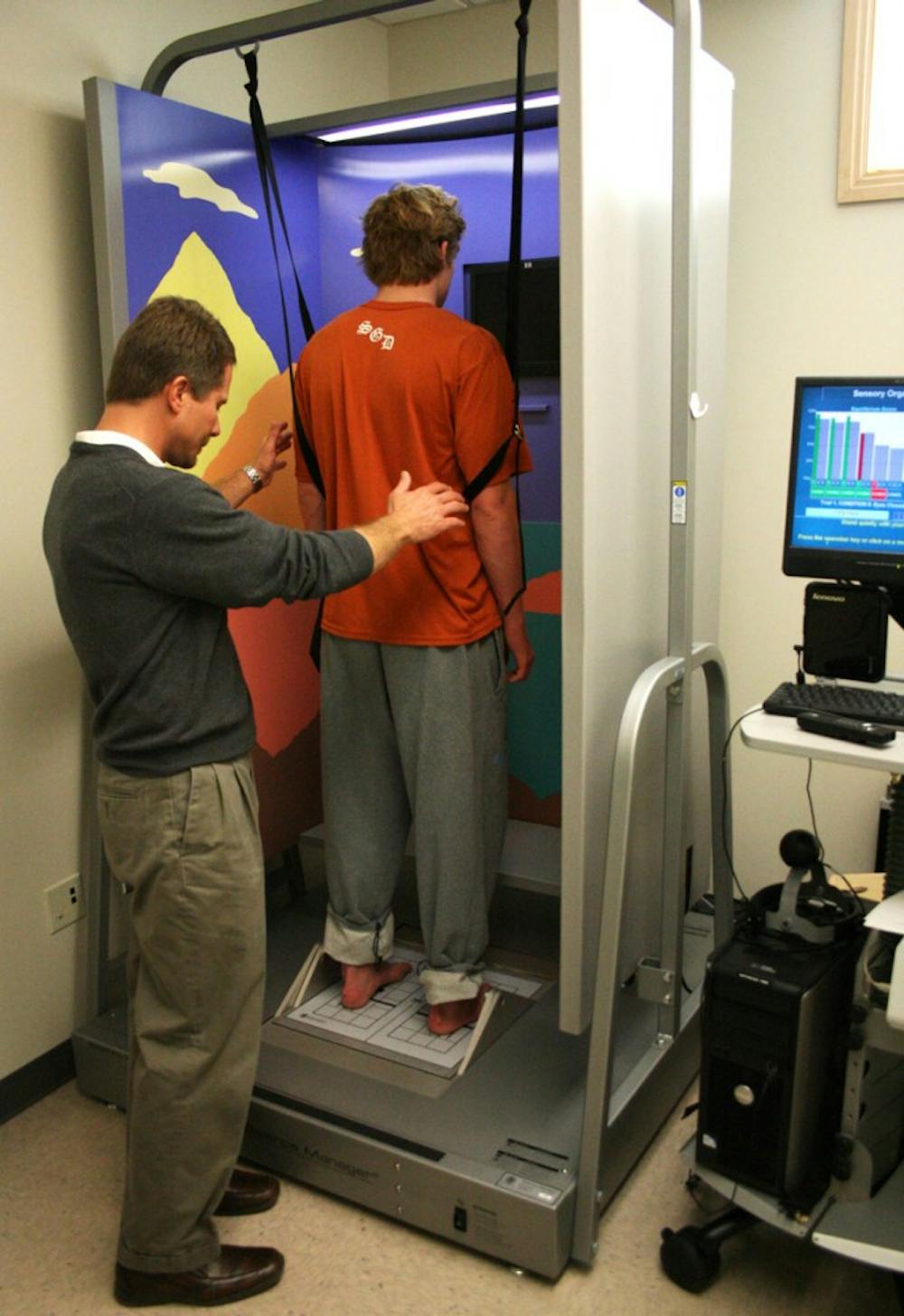“After they’ve had a concussion we can say, ‘Well look at this. This is what went wrong here,’” Guskiewicz said. “‘You’ve been doing this the past month, and we’ve gone back and looked at all of your impacts and you’re lowering your head. Those hits sustain the highest impacts.’”
For Lipford, that clinical application has saved him a lot of pain and a lot of missed game time after he sustained a concussion while playing in the third game of the season against Rutgers.
“We were running down on the kickoff and I had a head-to-head collision with a player on the other team,” Lipford said. “I was knocked out. I don’t even remember the last couple of steps before I made contact with the defender.”
Sidelined for at least a week, Lipford met with Guskiewicz and Trulock on how to change his approach in multiple situations on the field. By the time UNC played Clemson two weeks later, he was back in the game and making his blocks with life-saving technique changes.
“(Guskiewicz) will indicate to me, just in looking at the data, of the person we need to follow up on, and then I’ll be the one to actually follow up with them and then follow up with the coaches,” Trulock said.
“You hear all the time about great research being done, but if you don’t put that into practice and have an effect on people’s lives, what’s it worth?”
For this reason, UNC has been gaining national media coverage and praise for Guskiewicz’s active pursuit of change in the way sports deal with concussions.
That media coverage also hits home with Guskiewicz, who has become one of the nation’s go-to concussion experts. Not only has he been featured in The New York Times and CNN, but Guskiewicz also once considered abandoning his work as an athletic trainer to join the media full time.
After graduating from West Chester, Guskiewicz split his time between working at a sports medicine clinic and writing for the Philadelphia Inquirer. The journalism minor was awaiting a call from Columbia University’s Graduate School of Journalism. But when opportunity did call, it wasn’t from the media.
“I ended up getting an offer to go work with the Pittsburgh Steelers,” Guskiewicz said. “I was from western Pennsylvania and realized it was the opportunity of a lifetime — that sort of decided my path. But I often wonder what would’ve happened had I gone the journalism route.”
Thankfully for the brains of millions of athletes around the world, that wasn’t the case. As Guskiewicz earned his master’s degree from Pittsburgh while working on the field for the Steelers, it was running back and current ESPN analyst Merril Hoge’s multiple head traumas that sparked what would become Guskiewicz’s life work.
“After having a concussion in a game, he was driving and couldn’t find his way home, couldn’t have a conversation with his kids or his wife,” Guskiewicz said. “There was living proof in Merril Hoge that this was a problem.”
To get the day's news and headlines in your inbox each morning, sign up for our email newsletters.
His short time in the NFL was enough to spark Guskiewicz’s interest in the mismanagement of concussions, as well as their treatment, prevention and long-term effects.
Intent on fixing the problems he witnessed firsthand with Hoge and his teammates, Guskiewicz landed his first post-doctorate job at UNC. From there, he’s written his own path.
Now on the NFL’s head, neck and spine committee and the NCAA’s concussion committee, Guskiewicz could have an even larger role in shaping the future of football — not just at UNC, but for the game as a whole.
The chair of a subcommittee on rule changes and helmet safety, Guskiewicz has been asked to look at suggestions ranging from eliminating helmets during practices to removing kickoffs from the game altogether to limit the growing numbers of life-altering injuries. He adds to his time spent at UNC by studying concussions’ effects on retired NFL players, conducting research and teaching at both the undergraduate and graduate levels.
But when it comes to Guskiewicz, the lives of four growing athletes are the ones that matter most. As the father of four, Guskiewicz’s role as a family man, like that of his job for UNC athletics, always comes back to protection.
“Everyday when we come home, on the way back from practice or at the dinner table, I always want to know what you learned in school first and then what you learned on the football field,” Guskiewicz said. “Somewhere in that conversation, though, the question always comes up: ‘Did you keep your head up?’”
Contact the Sports Editor at sports@dailytarheel.com.




